Cascade Companion Series (26 vols.)
Digital Logos Edition
Overview
The Christian theological tradition is populated by inspired thinkers and their impactful writings. All too often, this rich body of work is inaccessible to the general reader. The Cascade Companions combine academic rigor with broad appeal and readability. They introduce nonspecialist readers to Christian authors, documents, themes, and movements with brief yet compelling volumes. This collection contains modern scholarship that addresses pressing questions. With these resources, readers can better minister in our current setting with timeless wisdom presented in clear language.
Seek out a greater understanding of church history with the Church History Collection (22 vols.).

- Provides ideal introductions to supplement the study of primary sources
- Offers engaging, accessible, scholarly overviews of key figures and theological concepts
- Prepares readers to plunge deeper into the church's most important figures and beliefs'
- Title: Cascade Companion Series
- Series: Cascade Companions
- Publisher: Cascade
- Volumes: 26
- Pages: 4,096
- Resource Type: Introductions
- Topic: Theology
Individual Titles
- Rudolf Bultmann: A Companion to His Theology by David W. Congdon
- John Calvin: A Companion to His Life and Theology by Donald K. McKim
- Scripture’s Knowing: A Companion to Biblical Epistemology by Dru Johnson
- Richard Hooker: A Companion to His Life and Work by W. Bradford Littlejohn
- Jeremiah: Prophet Like Moses by Jack R. Lundbom
- The Rule of Faith: A Guide by Everett Ferguson
- Jacob Arminius: The Man from Oudewater by Rustin E. Brian
- Forgiveness: A Theology by Anthony Bash
- Reading John by Christopher W. Skinner
- A Guide to St. Symeon the New Theologian by Hannah Hunt
- Reading Augustine: A Guide to the Confessions by Jason Byassee
- An Introduction to the Desert Fathers by Jason Byassee
- Basil of Caesarea: A Guide to His Life and Doctrine by Andrew Radde-Gallwitz
- Creationism and the Conflict over Evolution by Tatha Wiley
- A Way into Scholasticism: A Companion to St. Bonaventure’s The Soul’s Journey into God by Peter S. Dillard
- Angels, Worms, and Bogeys: The Christian Ethic of Pietism by Michelle A. Clifton-Soderstrom
- Justpeace Ethics: A Guide to Restorative Justice and Peacebuilding by Jarem Sawatsky
- The Letter to the Hebrews in Social-Scientific Perspective by David A. deSilva
- Reading Bonhoeffer: A Guide to His Spiritual Classics and Selected Writings on Peace by Geffrey B. Kelly
- Theological Theodicy by Daniel Castelo
- Theological Interpretation of Scripture by Stephen E. Fowl
- Christianity and Politics: A Brief Guide to the History by C.C. Pecknold
- Conflict, Community, and Honor: 1 Peter in Social-Scientific Perspective by John H. Elliott
- Feminism and Christianity: Questions and Answers in the Third Wave by Caryn D. Riswold
- Theology and Culture: A Guide to the Discussion by D. Stephen Long
- Reading Paul by Michael J. Gorman
This title is included in the following collections
You can save when you purchase this product as part of a collection.
2025 Portfolio Library
$4,749.99$3,562.492025 繁體中英雙語典藏版圖書資料庫
$5,999.99$4,499.992025 简体中英双语典藏版图书资料库
$5,999.99$4,499.992025 이중언어 포트폴리오 서재
$6,399.99$4,799.99
- $10,999.99$8,249.99
- $11,593.84$8,499.99
- $23,999.99$17,999.99
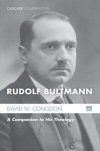
Rudolf Bultmann is one of the most widely known but least read theologians of the twentieth century. He is famous as the one who “demythologized” the New Testament, but very few understand what he meant by this or how his hermeneutical program connects to the other areas of his theological project. Bultmann presents a unique challenge to readers, not only because of his radical theological inquiry but also because of the way his ideas are worked out over time, primarily through short, occasional writings that present complex issues in a disarmingly straightforward manner.
In this introduction to his theologythe first of its kind in more than twenty years—David W. Congdon guides readers through ten central themes in Bultmann’s theology, ranging from eschatology and dialectic to freedom and advent. By gaining an understanding of these themes, students of Bultmann find the necessary tools to understand and profit from his writings. The result is not only an accessible guide for those encountering Bultmann for the first time but also a cohesive, systematic presentation of his thought for those wondering how his work might speak to our current context.
With great clarity and insight, focusing on themes which lie at the very heart of Bultmann’s theological project and placing him in conversation with recent and contemporary trends, David W. Congdon has written the best short introduction to Bultmann’s thought. The point is not to ‘return’ to the great New Testament scholar and theologian—but neither should we bypass him.
—Christophe Chalamet, professor, University of Geneva
Who better than David Congdon to take us into the work of Christianity’s greatest interpreter of Scripture in the modern period? With an expert’s grasp of the entire architecture of Rudolf Bultmann’s thought, Congdon leads the reader through its conceptual entry points. Here is a reliable primer, likely a classic, to guide both beginning students and well-schooled theologians away from the misconceptions, even myths, so often bedeviling treatments of Bultmann.
—James F. Kay, professor, Princeton Theological Seminary
In these pages, Bultmann stands before us as a difficult but compelling figure, a Christian thinker who took the eschatological vision of the New Testament as his charter and pursued its course with extraordinary tenacity and fearlessness. Congdon sets Bultmann’s thought into critical discussion with contemporary theology, posing sharp challenges to our current preferences for ressourcement and the rule of faith. And he saves the best till last. The book ends with a superb meditation on Bultmann’s Christmas sermons—a glimpse of Bultmann at his most attractive, or most seductive, depending on where you stand.
—Benjamin Myers, professor, Charles Sturt University
David Congdon’s lucid and innovative treatment of Rudolf Bultmann is an excellent contribution to scholarship. Those eager to understand, appreciate, and, most importantly, learn from one of the most important (and, alas, most misunderstood) ‘greats’ of twentieth-century European theology have, in this book, an indispensable resource.
—Paul Dafydd Jones, associate professor, Department of Religious Studies, University of Virginia
Being master of a subject matter as demanding as Rudolf Bultmann’s theology and a master communicator, capable of introducing that subject-matter to beginning students in a manner both interesting and arresting (!) is rare. David Congdon has that rare combination of skills. This is a wonderful ‘guide’ to Bultmann’s thought. Indeed, it is hard to imagine one more perfectly executed. It is a companion worthy of the thought of one of the real giants of twentieth century theology.
—Bruce McCormack, Charles Hodge Professor of Systematic Theology, Princeton Theological Seminary; author of Karl Barth’s Critically Realistic Dialectical Theology (Clarendon Press) and Orthodox and Modern: Studies in the Theology of Karl Barth (Baker Academic)
David W. Congdon is associate editor at IVP Academic. He is the author of The Mission of Demythologizing: Rudolf Bultmann’s Dialectical Theology (2015).
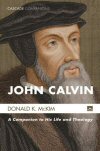
This unique volume is an introductory guide to the life and theology of John Calvin (1509-64). Calvin’s theology had a major impact on Protestant theology. Reformed churches throughout the world appropriate Calvin’s theological understandings. His work has provided important insights into Scripture and still communicates a vibrant Christian faith in modern settings. The first part of this book describes events in Calvin’s life that helped shape his major work, the Institutes of the Christian Religion. The second part follows the flow of the Institutes and provides a narrative exposition of this major work, with numerous quotations of Calvin’s own words. This enables readers to hear the author’s voice as his views are explained. This close reading of Calvin opens the door to further, more thorough Calvin studies.
A superb primer on the life and thought of John Calvin by one of our finest Reformation scholars. Highly recommended!
—Timothy George Founding Dean of Beeson Divinity School of Samford University, General Editor of the Reformation Commentary on Scripture
McKim’s accessible and lucid presentation of Calvin’s life as well as his thought through a summary of the Institutes of the Christian Religion prioritizes the voice of Calvin in a fresh way that provides a solid and useful introduction for any reader.
—Jennifer Powell McNutt, Associate Professor of Theology and History of Christianity, Degree Coordinator of M.A. History of Christianity Program, Chair of Graduate Council, Wheaton College Graduate School
John Calvin’s ideals for theological writing were clarity and brevity. Don McKim’s work would have made him proud. In fewer than two hundred pages, McKim gives a rich but accessible biography of Calvin, and an equally inviting summary journey through Calvin’s mature theology as found in the 1559 Institutes. It makes a good first exploration of the influential Reformed theologian as well as a ready reference guide.
—Gary Neal Hansen, Associate Professor of Church History, University of Dubuque Theological Seminary
Donald K. McKim is a former seminary Dean, Professor of Theology, and Executive Editor for Theology for Westminster John Knox Press. He is the author and editor of a number of books, many focusing on John Calvin and the Reformed theological tradition. He is an Honorably Retired minister in the Presbyterian Church (U.S.A.).
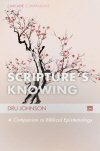
Scripture’s Knowing is a guide to the emerging field of philosophical study of Scripture, specifically about knowing. Assuming that the Scriptures speak verbosely and persistently about knowing, what do the biblical authors have to say? How do they conceptualize ideas like truth and knowledge? Most importantly, how do we come to confidently know anything at all? Scripture’s Knowing follows the discourse on knowledge through key biblical texts and shows the similarity of biblical knowing with the scientific enterprise. The findings are linked to the role of ritual in knowing and implications for theologians and churches today.
Dru Johnson has done the impossible, giving us an utterly accessible introduction to the problem of how biblical narratives and laws go about offering us knowledge. If you want to understand the process by which we come to see what the biblical story is trying to show us, this is the place to start.
—Yoram Hazony, author, The Philosophy of Hebrew Scripture and God and Politics in Esther
The many and varied streams of Dru Johnson’s own expertise and experience have blended into a single vision in this delightfully seasoned and profound work. Scripture’s Knowing is admirably pitched and packaged for easy access and dissemination. Buy it! Read it! Steep in it. Share it with your small group or class or congregation. This transformative understanding of knowing holds the prospect of blessing you, your church, and even culture.
—Esther Lightcap Meek, author, A Little Manual for Knowing
Dru Johnson is an Assistant Professor of Biblical Studies at The King’s College in New York City, cochair of the Hebrew Bible and Philosophy program unit in the Society of Biblical Literature, and a former Templeton Senior Research Fellow at the Institute for Advanced Studies—Shalem Center (now The Herzl Institute) in Jerusalem.
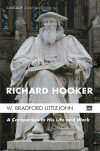
Although by common consent the greatest theologian of the Anglican tradition, Richard Hooker is little known in Protestant circles more generally, and increasingly neglected within the Anglican Communion. Although scholarship on Hooker has witnessed a dramatic renaissance within the last generation, thus far this has tended to make Hooker less, not more accessible to general audiences, and interpreters have been sharply divided on the meaning of his theology. This book aims to draw upon recent research in order to offer a fresh portrait of Hooker in his original historical context, one in which it had not yet occurred to any Englishman to assume the label “Anglican,” and to bring him to life for all branches of the contemporary church.
Part one examines his life, writings, and reputation, puncturing several old myths along the way. Part two seeks to establish Hooker’s theological and pastoral vision, exploring why he wrote, how he wrote, whom he was seeking to persuade, and whom he was seeking to refute. Part three analyzes key themes of Hooker’s theology—Scripture, Law, Church, and Sacraments—and how they related to his late Reformation context. Finally, the concluding chapter proposes Hooker’s method as a model for our confused contemporary age, combining fidelity to Scripture, historical awareness, and a pastorally sensitive pragmatism.
Richard Hooker is a name that many church people have heard of, but few have ever dipped into his works. . . Brad Littlejohn brings to bear an impressive range and depth of scholarship and critical insight to set Hooker in the context of the controversies of his time, and guides us through the maze of contemporary interpretations of Hooker’s thought and significance.
—Paul Avis, professor of theology, University of Leeds
Littlejohn’s companion, Richard Hooker, offers a splendidly accessible introduction to the life and work of this eminent but popularly neglected early-modern English theologian and philosopher. . . This volume offers an excellent point of departure for both scholars and non-specialist readers.
—Torrance Kirby, professor of ecclesiastical history, McGill University
Richard Hooker is the theologian of Anglicanism. But is he a theologian for Anglicans alone? Assuredly not! In this companion to Hooker, Littlejohn has produced a clearly written and accessible work that utilizes the recent resurgence of scholarly interest in Hooker to commend him to a wider audience. . . It is sure to be a resource of choice for those seeking a way into the thought of this great post-Reformation divine.
—Oliver D. Crisp, professor, Fuller Theological Seminary
W. Bradford Littlejohn (Ph.D, University of Edinburgh, 2013) is President of the Davenant Trust, an organization that supports historical research at the intersection of the church and academy. He also teaches philosophy at Moody Bible Institute. He is the author of several articles and book chapters on Richard Hooker and the Reformation period, and serves as editor of the Mercersburg Theology Study Series.
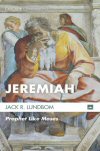
This book on Jeremiah seeks to inform students and lay readers of one of the truly great Hebrew prophets and extraordinary individuals of the ancient world. It presents major themes preserved in the book bearing Jeremiah’s name, one of the most prominent being Jeremiah’s understanding of himself as “the prophet like Moses.” Jeremiah remained faithful to his calling during the final days of Israel, when they fell to Nebuchadnezzar and the Babylonians in 586 BC. He suffered along with everyone else, but was nevertheless numbered among the survivors. From his confinement in the court of the guard he gave a dispirited remnant hope for the future: Jeremiah most famously announced a new covenant that God would make with his people in future days.
Only an experienced specialist like Jack Lundbom can present the difficult book of Jeremiah in such a succinct and engaging manner, outlining the trajectory from God’s promise and his powerful Word to the international orientation and lasting hope therein, and all set against the background of Israelite history and the biblical traditions. The book is well presented to engage today’s readers, with references to relevant political and historical situations, reflections, questions, and connections with the New Testament.
—Georg Fischer SJ, professor, University of Innsbruck, Austria
Jack Lundbom has contributed again on Jeremiah, this time aiming at the general reader. He wisely chose twelve scriptural sayings relating to the prophet, and expounded the themes therein. Reading this book, people can attend a holographic understanding of the prophet and his book. It serves as a springboard to theologies in the Old Testament. The reflection at the end of each chapter also extends the message to the contemporary. An excellent work!
—Jonathan Tsoi, associate professor of Old Testament, Lutheran Theological Seminary, Hong Kong
Jack R. Lundbom is a member of Clare Hall, University of Cambridge, and most recently has been Distinguished Visiting Scholar at Garrett-Evangelical Theological Seminary in Evanston, Illinois. He has written the three-volume Jeremiah for the Anchor Bible commentary series (1999; 2004), a commentary on Deuteronomy (2013), and most recently for Cascade Books, Theology in Language, Rhetoric, and Beyond (2014).
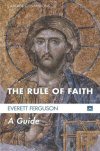
The rule of faith was a summary of apostolic preaching and teaching made by writers of the early Christian centuries. As such it carries great importance for what the early church considered basic to its being and identity. The rule was not a fixed creed, but varied in wording and content according to circumstances. Yet, despite this flexibility and diversity, there is a clear Christ-centered, Trinitarian core at the heart of the rule shared by the early apostolic churches.
In this short guide, Everett Ferguson introduces readers to the primary sources of our knowledge of the rule. He highlights the variety of ways in which ancient Christian authors spoke of the rule and examines scholarly attempts at interpreting this ancient evidence. Ferguson argues that statements of the rule of faith were used to instruct new or potential converts, to combat false teachings, and to provide a framework for interpreting the Scriptures. He maintains that the rule retains considerable importance for churches of the twenty-first century.
When paging through this book, my immediate reaction was: why was it not written earlier?. . . There is no better candidate to produce this book than Ferguson. . . [who] is well known for his precision of textual references and mature judgment for pointing out the doctrinal and pastoral relevance of the topics he treats. This book must be possessed by all students studying. . . questions concerning the early history of the New Testament canon and biblical hermeneutics.
—Father Denis Farkasfalvy, ocist, University of Dallas
Can the story of Scripture, the preaching and teaching of the apostles, be summed up in a way that can be passed from one generation to another? And how are Christians to distinguish between varying truth-claims? With the ease and depth of a master craftsman, Ferguson guides us through the regula fidei of the early Church to find an answer. Placing The Rule of Faith as a necessary companion to the well-known creeds, Ferguson brings to life again the vital truth-claims of early Christianity.
—George Kalantzis, professor of theology, The Wheaton Center for Early Christian Studies
—The Rule of Faith is an essential guide to the central beliefs of the ancient church, and Ferguson is a most trustworthy guide to its early history and development. This volume provides a collection of the most relevant primary texts and expert analysis by one of our most distinguished scholars of Christian origins. . . A splendid achievement!
—David G. Hunter, Cottrill-Rolfes Chair of Catholic Studies, University of Kentucky
Everett Ferguson is professor emeritus of Bible and church history at Abilene Christian University, Texas. He was editor of The Encyclopedia of Early Christianity. Cascade Books is reprinting his scholarly articles, The Early Church at Work and Worship, in three volumes.
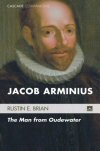
Jacob Arminius was a Dutch theologian whose views have become the basis of Arminianism and the Dutch Remonstrant movement, and are quite influential on Wesleyan, and therefore Methodist, theology as well. Arminius attempted to reform Reformed theology and ended up lending his name to a movement that resisted some of the primary tenets of Calvinism. Rustin E. Brian outlines the life and theology of Arminius, shedding fresh light on his life, theology, and writings. In hopes of better understanding Arminian theology and Arminianism, Brian concludes with a constructive comparison and contrast of Arminius and several prominent theological figures: Pelagius, John Wesley, and Karl Barth.
Much important and serious scholarship has been done in recent years to recover Arminius’s theology for a new generation of Christians. Rustin Brian adds to this recovery, providing a creative introduction to Arminius that draws upon and adds to this scholarly conversation while making the great theologian more accessible to lay readers.
—Mark H. Mann, coeditor, Reconsidering Arminius: Beyond the Reformed and Wesleyan Divide, Associate Professor of Theology and Director of the Wesleyan Center, Point Loma Nazarene University
Whether worn as a badge of honor or hurled in derision, the term ‘Arminian’ says both too little and too much. In this short book, Brian introduces us to ‘the man behind the adjective,’ telling us just enough about his background and beliefs to spark a conversation about Arminius’s place in the history of theology and the way theology might benefit from listening to him. What would a Reformed Wesleyan look like? Maybe like this.
—Matt Jenson, associate professor of theology, Torrey Honors Institute, Biola University
Jacob Arminius is a theologian known more from the perspective of his antagonists than from his own substantive theological work. Dissatisfied with any theology that set God’s will above God’s truth and self-diffusive goodness, Arminius resisted the pull of some powerful modern theological tendencies. His theology needs reconsideration in light of the collapse of those theological tendencies. In this important work, Rustin Brian provides what we need—an excellent introduction to Arminius as a theologian in his own right.
—D. Stephen Long, Cary M. Maguire University Professor in Ethics, Southern Methodist University
Rustin E. Brian is an ordained pastor in the Church of the Nazarene, currently pastoring Renton Church of the Nazarene in Renton, WA, and Adjunct Professor of Theology at Northwest Nazarene University and Seattle Pacific University. He is the author of Covering Up Luther: How Barth’s Christology Challenged the Deus Absconditus that Haunts Modernity.
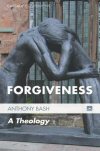
Many endorse the idea of personal forgiveness without fully understanding its complexity and subtlety. This book is a careful and detailed theological exploration of personal forgiveness. It sets forgiveness in its ancient and biblical context, as well as drawing on contemporary debates among philosophers, psychological therapists, and international relations theorists. Forgiveness is written in a clear, accessible style for both the specialist and the non-specialist, and even the most difficult issues are clearly explained and their significance explored. Anthony Bash seeks to restore forgiveness to the center of Christian doctrine and practice, and to defend its place in personal and public life.
Those already familiar with Bash’s earlier books and articles know that he has done more than others to deepen and enrich our understanding of forgiveness in Christian ethics and pastoral theology. . . In this new book he extends this exploration into more distinctly theological territory. The result is deeply impressive and thought-provoking.
—Robin Gill, emeritus professor of applied theology, University of Kent
For too long theologians have failed to give the subject of interpersonal forgiveness sustained or rigorous attention. . . . In Forgiveness, Bash offers the fruits of his determined and diligent study in a succinct and accessible form. This short book should have a big impact on the many who now recognize that it is important to know what the Bible says about forgiveness between people.
—Stephen Cherry, dean, King’s College, Cambridge
Bash’s book goes beyond the sentimental cliches and platitudes that often count as Christian comments on forgiveness and has provided us with a serious study that draws on important work in philosophy and theology and also involves illuminating discussions of scripture. It advances the conversation on the topic of forgiveness and will be valuable reading for Christians and non-Christians as well.
—Jeffrie Murphy, Regent’s Professor of Law and Philosophy, Arizona State University
This is a rigorous yet highly readable study of the Christian theology of forgiveness which throws light into many previously under-explored corners. It should appeal greatly to teachers and students of theology and philosophy, and also to the general reader who wishes to know more in depth about the theory and practice of Christian forgiveness.
—Geoffrey Scarre, professor of philosophy, Durham University
Forgiveness is a complex business—both in practice and in concept. Anthony Bash guides us skillfully through these complexities and put his expertise in the New Testament to particularly good effect. This is a very welcome and highly accessible analysis of a hotly debated topic.
—John Barclay, Lightfoot Professor of Divinity, Durham University
Anthony Bash teaches New Testament at Durham University. He is also Vice-Master of Hatfield College, Durham University. Anthony is author of Forgiveness and Christian Ethics (2007) and Just Forgiveness (2011).
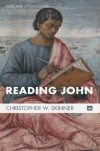
The Gospel of John is often found at the center of discussions about the Bible and its relation to Christian theology. It is difficult to quantify the impact John’s Gospel has had on both the historical development of Christian doctrine and the various expressions of Christian devotion. All too often, however, readers have failed to understand the Gospel as an autonomous text with its own unique story to tell. More often than not, the Gospel of John is swept into a reading approach that either conflates or attempts to harmonize with other accounts of Jesus’ life. This book emphasizes the uniqueness of John’s story of Jesus and attempts to provide readers with a road map for appreciating the historical context and literary features of the text. The aim of this guide is to help others become better, more perceptive readers of the Gospel of John, with an ability to trace the rhetoric of the narrative from beginning to end.
Studying or teaching John? Reading John takes anyone interested in learning to read the Gospel of John and leads them step by step on a delightful journey into its strange and wonderful landscape, with the result that each chapter builds reading competence. Skinner is impressive as a teacher and guide, equally at home in the ancient world, the Gospel of John, and twenty-first-century culture, and he has a keen ear for the nuances of each. This guide is ideal for Bible study groups and college classes.
—R. Alan Culpepper, dean, McAfee School of Theology
In this fresh introduction to John, Christopher Skinner treats readers of John to some of the most valuable of recent approaches to the Fourth Gospel clearly and succinctly. Embracing the narrative through the lens of the Prologue, appreciating the sketching of characters, understanding misunderstandings, and seeing John as a two-level drama afford new insights that would otherwise be lost. Here we see John’s theological, historical, and literary riddles addressed in helpful and compelling ways; Skinner’s readers will not be disappointed!
—Paul N. Anderson, professor of biblical and Quaker studies, George Fox University
Christopher W. Skinner is Associate Professor of Religion at the University of Mount Olive and Teaching Assistant Professor in the Department of Philosophy and Religious Studies at East Carolina University. His previous books include John and Thomas: Gospels in Conflict? Johannine Characterization and the Thomas Question, What Are They Saying about the Gospel of Thomas?, and Character Studies and the Gospel of Mark.
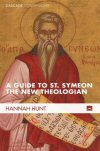
A Companion to St. Symeon the New Theologian is an accessible guide to one of the great mystical writers of the Eastern Christian tradition. His impassioned writings bring to life the monasticism of the Byzantine Empire at the end of the tenth century. Dr Hunt’s succinct analysis of his life, times, and work draws from his homilies, hymns, and other writings to show his unique contribution to the spiritual life. The book details his development as a monk (shaped by the guidance and example of the Studite monk Symeon Eulables), his conflicts with the church authorities, and his inspiration of pupils such as Nicetas Stethatos, who later wrote a biography of his master.
Hunt places St. Symeon’s conviction that only direct experience of God’s divine light confers authority in the context of his work as an abbot and spiritual father. Other aspects of his theology—such as the importance of tears, visions of light, and obedience to one’s spiritual father—are also assessed. An indication of further reading, indices, and a comprehensive glossary of unfamiliar terms make this an invaluable addition to the field of religion, both for those studying church history or religious studies and for general Christian readers.
This is indeed an excellent companion to St. Symeon the New Theologian—informative, insightful, sensitive, and yet readily accessible, a great introduction to one of the most important spiritual writers of the Eastern Christian tradition. Hannah Hunt admirably introduces the reader to Symeon in all his different dimensions: his historical context in eleventh-century Constantinople; his writings and their genres; his place in the traditions of Eastern Christian monasticism and theology; and his legacy.
—John Behr, dean and professor of patristics, St. Vladimir’s Orthodox Theological Seminary, Crestwood, NY
Most of Symeon’s writings are inherently inspiring for Christian readers, but the significance of some ideas are easily lost in a centuries-long culture gap between a modern reader and the medieval world. Hannah Hunt’s A Guide to St. Symeon the New Theologian will help scholars and lay readers alike to more fully appreciate Symeon’s ideas. Hunt’s thorough and concise descriptions of the social, political, and theological context of Symeon’s life and works are especially illuminating. She also boldly takes on the question ‘What Is Mysticism’ and satisfyingly answers in the context of historical theology.
—Daniel K. Griggs, professor of Latin, Butte College, Oroville, CA
Hannah Hunt is Associate Principal Lecturer in Theology and Reader in Eastern Christian Theology at Leeds Trinity University, England. She is the author of Joy-Bearing Grief, Clothed in the Body and numerous chapters and articles on St. Symeon the New Theologian and other Eastern Christian theologians.
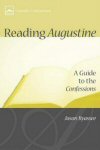
The Confessions of St. Augustine is one of few Christian classics still widely read in the secular academy. Yet, oddly enough, it is not often read in the manner Augustine appears to have intended. The church has cherished Augustine’s writing for centuries as a model of conversion, devotion, friendship, and the love of God. This book is a companion for any reader of the Confessions—in an academic, ecclesial, or devotional context—informed by the latest scholarship and ever-leading the reader, with Augustine, toward God.
Augustine’s Confessions are a glorious exploration of a living, gracious God. We could have no better guide through Augustine than one of his great friends, Jason Byassee. For anyone who has longed for the living God, for anyone who wants to explore the depth and breadth of the human soul, Byassee opens up new dimensions of this classic of the Christian faith.
—William Willimon, bishop, United Methodist Church, North Alabama
Jason Byassee’s learned, intimate, and engaging guide to Augustine’s Confessions is a delight to read and a wonderful resource for everyone who wishes to become the faithful and discerning reader Augustine so fervently desired.
—Carol Zaleski, professor of world religions, Smith College
Jason Byassee is an ideal guide to the Confessions: lucid, unpretentiously learned, witty, and above all generous—to his subject, to his fellow scholars, and to the reader.
—John Wilson, editor, Books & Culture
Jason Byassee received his PhD in theology from Duke University and is currently serving as a fellow in theology and leadership there. He also serves as senior pastor of Boone United Methodist Church in the Western North Carolina Conference. Byassee is author of Praise Seeking Understanding: Reading the Psalms with Augustine.
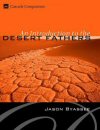
The desert fathers isolated themselves from the church of their day. They saw it as being defined by empire. They saw a typical Christian faith as cold and listless. They retreated to the desert to do battle against demons and against their own worst desires. They had no intention of becoming famous, but their Sayings have inspired millions of imitators over the centuries. This guide is meant to accompany a reading of the Sayings of the Desert Fathers, in hopes that modern readers will imitate their lives of poverty, chastity, and obedience. With this resource, readers can grow a more imaginative and passionate faith.
Jason Byassee’s An Introduction to the Desert Fathers is an excellent companion to all who seek to glean wisdom from the monks’ encounters with the realities of God and of their sin. By drawing together the world of fourth-century monasticism with our consumerist culture of the twenty-first century, Byassee helps us discern the call of the desert today.
—J. Warren Smith, associate professor of historical theology, Duke Divinity School
In this beautiful, informative, probing, and wise introduction to the spirituality of the desert, Byassee both immerses us in, and invites us to embrace, an older, sometimes alien, way of inhabiting our relationship with the triune God.
—Lauren F. Winner, assistant professor of Christian spirituality, Duke Divinity School
. . . What sets this little book apart from others on desert spirituality is Byassee’s ability to help modern readers understand and practice the wisdom the desert monks offer.
—Evangelical Review of Theology
Jason Byassee received his PhD in theology from Duke University and is currently serving as a fellow in theology and leadership there. He also serves as senior pastor of Boone United Methodist Church in the Western North Carolina Conference. Byassee is author of Praise Seeking Understanding: Reading the Psalms with Augustine.
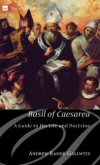
Studying the early church can feel like entering a maze of bishops, emperors, councils, and arcane controversies. This book introduces early Christian theology by focusing on one particularly influential figure, Basil of Caesarea (330–378). It views Basil against the backdrop of a Roman Empire that was adopting Christianity. In Basil’s day, Christians were looking for unity in the teaching and practice of their faith. This study acquaints the student with Basil’s brilliant—and often neglected—theological writings. In particular, Saint Basil’s reflections on the Trinity emerge from these pages as fascinating and illuminating testimonies to the faith of early Christians.
For decades, Basil’s thought was overshadowed by the reputation of his brother, Gregory of Nyssa. But in recent years a new generation of scholarship—Völker Drecoll, Mark DelCogliano, Philip Rousseau, and Andrew Radde-Gallwtiz—has shown us anew the power of Basil as theologian. . . This concise and elegant discussion offers us the best short introduction to Basil available in any language.
—Lewis Ayres, professor of Catholic theology, Durham University
Basil of Caesarea’s gifts as church politician and monastic founder have attracted much attention in recent scholarly literature, though his importance as a thinker and theologian had been neglected in favor of his younger brother, Gregory of Nyssa. In this clearly written book, Andrew Radde-Gallwitz helps us see Basil’s brilliance as a theologian. Basil of Caesarea establishes Radde-Gallwitz as one of the finest scholars of Christian late antiquity.
—Andrew Louth, emeritus professor of patristic and Byzantine studies, Durham University
Andrew Radde-Gallwitz is assistant professor of theology at Loyola University, Chicago. He is the author of Basil of Caesarea, Gregory of Nyssa, and Transformation of Divine Simplicity.
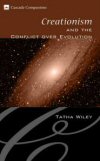
How do our current notions of the workings of the universe fit with our deepest convictions about its meaning and value? From a purely religious viewpoint, we grasp the world as a gift from our Creator. From a purely scientific viewpoint, we apprehend it as evolving, in process, and changing. How do we bring these apprehensions together? Is it possible that these concepts are complementary (i.e. creation and evolution)? Or are they contradictory (i.e. creation or evolution)?
The way in which we answer these questions carries personal and intellectual consequences. The answer is a foundational element in a worldview within which we order our religious beliefs and scientific judgments.
The scientific failures of ‘Intelligent Design’ and other forms of creationism have been detailed in dozens of books, scores of articles, and in a handful of spectacular court cases. What Tatha Wiley adds to this mix is a provocative and highly readable analysis of the theological failings of today’s creationist movement. It will surprise those who assume that creationism is rooted in Christian tradition, and it will challenge those who believe that the biblical narrative is hopelessly at odds with modern science.
—Kenneth R. Miller, professor of biology, Brown University; author of Finding Darwin’s God and Only a Theory
Tatha Wiley is the author of Original Sin: Origins, Developments, Contemporary Meaning and Paul and the Gentile Women: Reframing Galatians. She is editor of Thinking of Christ: Proclamation, Explanation, Meaning and the series Engaging Theology: Catholic Perspectives. She teaches theology at the University of St. Thomas and the College of St. Catherine in St. Paul, Minnesota.

St. Bonaventure of Bagnoregio’s The Soul’s Journey into God is a masterpiece of thirteenth-century scholasticism. This analysis of Bonaventure’s seminal treatise is both comprehensive and uncomplicated to contemporary audiences. Reinvigorating the medieval tradition of critical commentary for the twenty-first century, Peter Dillard’s A Way into Scholasticism: A Companion to St. Bonaventure’s “The Soul’s Journey into God” introduces readers to basic scholastic concepts and arguments by expounding and evaluating Bonaventure’s speculative system. Dillard also highlights the relevance of Bonaventure’s thought for contemporary philosophical theology. The book will appeal to a wide audience, including seminarians, clergy, brothers and sisters of religious orders, students at the advanced undergraduate or graduate levels, professional scholars, and anyone seeking a better understanding of the scholastic intellectual tradition.
This is a powerful reading and appreciation of Bonaventure’s most famous work, The Soul’s Journey into God. . . In spare, precise, and occasionally elegant prose, Dillard brings a contemporary mentality to bear on Bonaventure’s project and every step involved in the progress through six stages of spiritual growth leading to the possibility of mystical contemplation or ecstasy. . . This would be an excellent text for those needing an introduction to scholasticism as well as for those who feel they have nothing left to learn from scholasticism.
—Heythrop Journal
Peter S. Dillard is a professional philosopher, theologian, and writer living in Tucson, Arizona. He is the author of Heidegger and Philosophical Atheology, A Neo-Scholastic Critique.
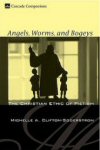
From their theological and devotional writings to their social and ecclesial practices, the fathers and mothers of Pietism boldly declared the ethical spirit of the Christian faith. This seventeenth-century renewal movement inspired a simple Christian ethic by connecting Christian character with the theological virtues of faith, hope, and love. The Pietists sought to cultivate these virtues by reading Scripture together, empowering the common priesthood of believers, and engaging in social and ecclesial reform toward the end of spreading the gospel.
Pietism brought together faith and life, Word and deed, and piety and social reform. They returned to basic belief in the power of God’s Word to engender faith and transform human life. This book celebrates Pietism’s contribution by telling the stories of three early figures—Philipp Jakob Spener, Johanna Eleonora Petersen, and August Hermann Francke—as they attended to issues of class, gender, poverty, and education through the lens of Scripture. In addition to clarifying what historians call “one of the least understood movements in the history of Christianity,” this book challenges a religious culture that juxtaposes faith and social action. It rehabilitates the Pietist heritage and its central role in the birth of Evangelicalism.
If living fully and faithfully as followers of Christ today in vibrant community matters to you, read this book. Angels, Worms, and Bogeys not only faithfully illuminates the past, it also paints a picture of what a faithful future will look like for the church; alive in Christ, centered on the Word, empowering the whole people of God to live Christ incarnate in our world today. This engagingly written and highly accessible volume vividly captures a much neglected, often misunderstood, but extremely important period in church history.
—Donn Engebretson, vice-president, Evangelical Covenant Church
This primer on the social ethics of Pietism is long overdue and most welcome. Many Protestant traditions, as well as streams of Catholicism and Judaism, continue to be shaped by the organic mutuality of head, heart, and hands, demonstrating Pietism’s contemporary relevance. The heart of Pietism—the glory of God and the good of one’s neighbor—is universal to religious experience and a lived faith. Clifton-Soderstrom writes boldly and compassionately as one rooted in the body of Christ, the Church.
—Philip J. Anderson, professor of church history, North Park Theological Seminary
Michelle A. Clifton-Soderstrom is an assistant professor of theology and ethics at North Park Theological Seminary in Chicago. She has published in Journal of Medicine and Philosophy, Political Theology, and The Covenant Companion.
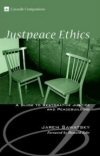
People too often forget that conflicts are between people. Justice and peace too often serve as abstract ideals. We have not yet learned enough about how these high-minded concepts can also be a means of conflict resolution. Drawing on the work of leading peace and restorative justice practitioners, Justpeace Ethics identifies components of a justpeace imagination—the basis of an alternative ethic, where the end goal is referenced with each step. In this simple companion to justpeace ethics, Jarem Sawatsky helps those struggling with how to respond to conflict and violence in just and peaceful ways.
With wisdom and sensitivity, Justpeace Ethics explores how justice and peace become one. There is genius in the way it holds together diverging values: interconnectedness and individual uniqueness, immediate care and long-term thinking, change and humility, needs-focused action and nonviolence, empowerment and responsibility. In such an ethic, life is sacred, relationships are central, and justice is beautiful. A must read for those who long for a better world.
—John Derksen, associate professor of conflict resolution studies, Menno Simons College, Winnipeg, Canada
This book is an enormously valuable contribution to thinking about doing justice and building peace. . . Justpeace Ethics provides an immensely practical guide to those seeking to build peace and justice. At the same time, it is anything but a simple ‘how to’ book. Rather, the patient reader is rewarded with an account of the values of restorative justice and peacebuilding that is deeply sophisticated, philosophically profound, and rooted in awareness of the complexity of thinking and acting ethically.
—Gerry Johnstone, author, Restorative Justice: Ideas, Values, Debates
This book provides a fresh and provocative perspective on the intersection of restorative justice and conflict transformation. . . This is a must-read for conflict resolution academics and practitioners.
—Neil Funk-Unrau, associate professor of conflict resolution studies, Menno Simons College, Winnipeg, Canada
Jarem Sawatsky is an assistant professor of peace and conflict transformation studies at Canadian Mennonite University.
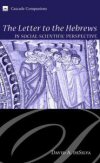
Mystery surrounds the authorship, date, and audience of the book of Hebrews. However, answers can be found by asking the right kind of questions. In this volume, David deSilva explores Hebrews through a social-scientific lens, asking one of the most important questions when interpreting letters and sermons: What was going on in the community to occasion such a response?
DeSilva looks for clues concerning the anonymous author, his education level, the influence of the Greek environment, and his self-perception. In addition, deSilva provides a social profile of the audience that includes location, ethnicity, and class status. deSilva also brings to light the author’s aims of helping protect Christian converts from persecution and social shame. This book not only helps Hebrews come alive for contemporary readers; it also expands the readers’ tools for asking fresh questions and exploring new dimensions in other biblical texts.
Modern readers too often forget that the sermon we call Hebrews—a powerful, timeless word that reaches to the heavens—was written in a nitty-gritty, socio-cultural context and was profoundly shaped by that context. . . Whether analyzing the author’s rhetorical strategy, the demands of gratitude upon the audience, or the shaping of social identity in a religious group, deSilva provides his readers with a new lens through which to follow the author’s arguments and assess the implications for ‘hearing’ Hebrews in the modern world.
—George H. Guthrie, professor of Bible, Union University
David deSilva is a recognized expert in socio-rhetorical analysis, honor-shame discourse, and the Epistle to the Hebrews. All three converge in this slender but rich volume. It is conversant with modern theory, but thoroughly rooted in the ancient sources. While chiefly focused on the first century biblical message, deSilva’s analysis will also help modern readers to be shaped and sustained by this ‘word of exhortation’ (Heb 13:22).
—N. Clayton Croy, associate professor of New Testament, Trinity Lutheran Seminary
David A. deSilva is a professor of New Testament and Greek at Ashland Theological Seminary in Ashland, Ohio, and an ordained elder in the Florida Conference of the United Methodist Church. He is the author of 20 books, including Global Readings: A Sri Lankan Commentary on Paul’s Letter to the Galatians; Seeing Things John’s Way: The Rhetoric of the Book of Revelation; An Introduction to the New Testament: Contexts, Methods & Ministry Formation; Introducing the Apocrypha; and Perseverance in Gratitude: A Socio-Rhetorical Commentary on the Epistle “to the Hebrews”.
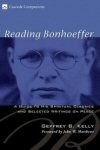
Dorothee Soelle wrote, “Dietrich Bonhoeffer is the one German theologian who will lead us into the third millennium.” Today, Bonhoeffer continues to inspire new generations as a spiritual guide to peace and social justice. This book by Geffrey Kelly provides a critical analysis and reading guide to two of his spiritual classics: Discipleship and Life Together. Reading Bonhoeffer offers a running commentary on each segment of these popular texts. Included discussion questions are suitable for the university and seminary classroom, as well as parish adult-education programs. In a final section of the book, Kelly excerpts and analyzes three significant texts by Bonhoeffer on the need for world peace.
Geffrey Kelly fuses personal characteristics that define him—deep sensitivity for spirituality, ecumenical openness and knowledge, the discipline of individual and communal practice of devotion, a sharp eye for contextuality, and his unmistakable Irish passion—and mingles them into this study of two widely acclaimed works by Bonhoeffer. The combination of those elements, and his intimate knowledge of the literature by and on Bonhoeffer, make for a fresh, well-written, and compelling introduction. . . and highlight Dietrich Bonhoeffer’s relevance for living in today’s context as followers of Christ.
—H. Martin Rumscheidt, emeritus professor of historical theology, University of Windsor, Halifax, Nova Scotia
Reading Bonhoeffer—both vintage Kelly and vintage Bonhoeffer—will serve to introduce yet another generation to this important voice from the church’s immediate past. Specialists and those looking for an introduction to Bonhoeffer’s faith and witness, as well as the average Christian seeking to grow in faith, will benefit from this text. In this presentation, both Bonhoeffer’s and Kelly’s passion for Christian discipleship comes through.
—H. Gaylon Barker, vice president, International Bonhoeffer Society, English Language Section
Geffrey Kelley, a prolific writer in the field of theology and religion, has now provided what I think is his best and most helpful work in spirituality—a work useful for ordinary readers as well as scholars in living their own daily lives.
—Charles W. Sensel, emeritus board member, International Bonhoeffer Society, English Language Section
Geffrey B. Kelly is a professor of systematic theology at La Salle University in Philadelphia, Pennsylvania. Best known for his research and publications on the theology and spirituality of Dietrich Bonhoeffer, Kelly is past president of the International Bonhoeffer Society, English Language Section. The present book is the offshoot of his editorial work for the Dietrich Bonhoeffer Works, English Edition—the new translations and critical editions of the collected writings of Bonhoeffer. Among his recent works on Bonhoeffer are Liberating Faith, The Cost of Moral Leadership, and A Testament to Freedom.
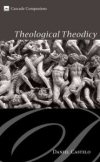
“Theodicy” is a perennial question in Christianity. The way this moral question has been pursued in the past is problematic on a number of counts. Most significantly, past efforts have generally been insufficiently theological. This work hopes to subvert and reconfigure the theodical task in a way accessible to nonspecialists. The author reminds readers that the “god” of theodicy is the Triune God of Christian confession, a key point that dramatically shifts philosophical discussion to matters of theology.
If we are to speak with theological intelligence and Christian compassion about the nature, causes, and overcoming of evil, we must first speak of the God whom Christians confess and in whom they hope. This elegant, perceptive, and gentle book shows us why theology matters in theodicy.
—John Webster, chair of systematic theology, King’s College
This book addresses a timely, critically urgent, and complex topic. Daniel Castelo engages it with grace, humility, and deep understanding. Many books on theodicy read with philosophical detachment. Castelo writes as a Christian theologian fully committed to practicing discipleship. The questions he faces are no mere abstractions, but the stuff of life. Castelo knows exactly when to speak with bold clarity and when to remain reverently silent. Anyone who reads this book will do so with great profit.
—Stephen Rankin, chaplain and minister, Southern Methodist University
Theological Theodicy is a richly textured and accessible exception to the rule of failed theodicies. Informed by the Catholic spiritual-doctrinal tradition and fired by Pentecostal sensibilities, Castelo faces troubling questions and refuses all premature resolutions. With humility and verve, he calls for spirited, virtuous embodiment of the gospel as counter-witness to the evils of this present age.
—Chris Green, assistant professor of theology, Pentecostal Theological Seminary
Daniel Castelo guides readers through a thoughtful and insightful exploration of the problem of suffering. Castelo’s approach honors the mystery of God, who cannot be fully explained and is thus inherently apophatic. His fundamental understanding of evil is a scandalous ‘sickness or malady,’ a condition of anti-godness. With theodicy being perhaps the most pressing issue today—not just in seminary classrooms, but in the world that feels godforsaken—Castelo’s work offers a hopeful and therapeutic vision.
—Elaine A. Heath, associate professor of evangelism, Southern Methodist University
Daniel Castelo is an associate professor of theology at Seattle Pacific University. He is the author of The Apathetic God.
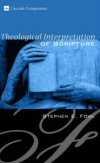
Christians have interpreted Scripture with the aim of deepening their life with God and each other since the very beginning of the church. The past 20 years or so have borne an explosion of scholarly writing devoted to the theological interpretation of Scripture. Stephen Fowl introduces readers to important people, texts, and issues in the Scriptures. This companion explores some of the connections between Christian practice of theological interpretation and the more recent body of scholarly literature.
Steve Fowl has been both a pioneer and a leader in the return to theological interpretation. In this concise book, he offers us a truly theological and ecclesial account of theological interpretation. It is an inspiring, liberating, and practical work, encouraging all Christians to interpret Scripture so as to find our proper end in ever-deeper communion with God and one another in anticipation of the fullness of God’s reign.
—Michael J. Gorman, dean, Ecumenical Institute of Theology, St. Mary’s Seminary and University
In this brief companion we find a focused, clear account of major themes in Steve Fowl’s approach as well as gracious interaction with the work of others and numerous illustrative appeals to Scripture itself. This is definitely a case in which less is more: attention to this little book will prove very fruitful for engagement in biblical interpretation as a theological practice.
—Daniel J. Treier, professor of theology, Wheaton College
Fowl here plays the role not only of companion but guide and host in this clear and compelling introduction to the most important turn-of-the-twentieth-century development in biblical interpretation. He argues that Christian readers should interpret the Bible with an overriding interest in God’s interest in using the Bible to promote communion. He practices what he preaches: he is generous towards those with whom he disagrees and gives fair descriptions of other approaches to theological interpretation.
—Kevin J. Vanhoozer, research professor of systematic theology, Trinity Evangelical Divinity School
Stephen E. Fowl’s latest, Theological Interpretation of Scripture, displays gems in the treasure trove of the new-yet-venerable task: reading the Bible as Scripture of the church. Fowl helps us to think theologically about reading Christian Scripture as the living voice of God. Fowl invites us into a ‘cocktail party’ with his conversation partners in this renewal of reading sacra scriptura for the church’s life and witness. Entirely accessible, thoroughly convincing, with a sense of adventure and hope. May his tribe increase!
—Kathryn Greene-McCreight, associate priest, St. John’s Episcopal Church, New Haven, CT
Stephen E. Fowl is the chair of the department of theology at Loyola College in Maryland. He is the author of several books, including Engaging Scripture: A Model for Theological Interpretation, Reading in Communion: Scripture and Ethics in Christian Life with L. Gregory Jones, and the Two Horizons commentary on Philippians.
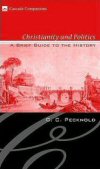
In this volume, Pecknold shows how early Christianity reshaped the Western political imagination with its new theological claims about eschatological time, participation, and communion with God and neighbor. The author focuses on an ancient view of the church as the “mystical body of Christ.” He traces shifts in this term’s use and meaning throughout early, medieval, and modern periods. This change, he writes, shifts how we understand the nature of the person, the community, and the moral conscience affects the relationship between Christianity and politics. While there are many accounts of this narrative from political or ecclesiastical history, few avoid the artificial separation of the two. This book fills that gap and presents a readable, concise, and thought-provoking introduction in the contentious relationship between Christianity and politics.
Political theology—thinking theologically about politics and understanding all political thought as first-and-last theological—is a lively field that until now has lacked a lucid and elegantly brief introduction. Pecknold’s book fills that gap, and more: it makes a real theoretical contribution of its own, most notably in its treatment of the migration of the treatment of conscience from church to state, and the effects of that migration on the understanding of freedom, political and otherwise.
—Paul J. Griffiths, Warren Chair of Catholic Theology, Duke Divinity School
Modern life and thought has a centripetal force, separating into discrete units what should be held together: politics, economics, theology, metaphysics, liturgy, and history. This division of labor creates specialists who can see the units but lack focus for a larger vision. . . In this substantive, readable, brief history of the relation between theology and politics, Pecknold focuses our vision by bringing together his own considerable acumen for both theology and politics. This comprehensive work shows connections that only someone of his breadth of knowledge could see. The result is a first-rate work that sets the bar for political theology.
—D. Stephen Long, professor of systematic theology, Marquette University
If it is true that ‘youth is wasted on the young,’ then to restrict this so-called primer only to beginning learners or students would be wasteful in the extreme. This is a first-rate book, a serious and fascinating work on theology and politics that masquerades as a gateway resource. Yet it also succeeds as an outstanding introduction—readable without being simplistic, engaging key voices and eras in the long interaction between Christianity and politics. I can’t wait to use this book with students, both to give them a solid grounding in key ideas and sources, as well as whetting their appetites for joining in these crucial conversations and debates. Anyone with an interest in the church and politics will benefit from this book.
—Michael Budde, professor of political science, DePaul University
At last I have found a textbook for my undergraduate course on Christianity and Politics! Pecknold’s book is brief and crystal clear, ideally suited to supplement primary source readings in an introductory class. This book helps the student grasp the sweep of Christianity’s political history in a relatively few deft strokes. The broad-brush approach does not mean the book is simplistic, however. To the contrary, Pecknold’s analysis is insightful, engaging, and at times contentious. Pecknold shows how theological concepts like ‘mystical body’ have wandered in and out of different political arrangements. In so doing, he shows students how church history and political history are not two separate subjects but one, and a fascinating one at that.
—William T. Cavanaugh, professor of theology, St. Thomas University
C.C. Pecknold is an assistant professor of historical and systematic theology at The Catholic University of America in Washington, DC.
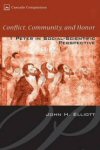
Conflict, Community, and Honor consists of two studies expanding John H. Elliott’s previous volume on 1 Peter, The Elect and the Holy. He places a tradition-and-redaction analysis of 1 Peter 2:4–10 into a larger literary, social, and cultural framework. The first essay views the social situation and rhetorical strategy of 1 Peter. The second essay demonstrates how 1 Peter is shaped by “pivotal values” of ancient Mediterranean culture, namely honor and shame. this important study will benefit teachers and pastors in communicating ancient truths in a modern setting.
At a time when the market-driven church is tempted to settle for being little more than an interest group, anxiously chasing its market share, this little book on 1 Peter offers nothing less than a new vision for the church, that of a quiet leaven, grounded with pride and confidence in its wronged and risen Lord, to whom it leaves the issue of all things. Elliott has fire in his belly; cut his words and they bleed. Elliott writes with the clarity of urgency. The heat is in the light. A memorable book.
—The Rev. Peter Fribley, PhD, parish pastor, Presbyterian Church U.S.A.
Affirming that 1 Peter represents from beginning to end a coherent and integrated line of thought, Prof. Elliott seeks to show in these two essays how this pastoral letter, forged to respond to the alienated situation of its readers, employs the conceptuality of the moral discourse and pivotal values of honor and shame that reigned in its contemporary world. The book is an excellent introduction to Prof. Elliott’s seminal work in applying social-scientific analysis of this New Testament writing, and will richly reward its careful reader.
—Paul J. Achtemeier, author, 1 Peter
Elliott, already well known for his work on 1 Peter and on social-scientific criticism, here brings together two essays that open for the reader the message and the world of 1 Peter. This simple, straightforward reading reveals the letter in its own context, in such a way that we can appropriate its message and values into our own.
—Carolyn Osiek, coauthor, A Woman’s Place: House Churches in Earliest Christianity
These classic studies by one of the foremost interpreters of 1 Peter can serve both to introduce the letter to those who know, little about it and to enlarge and enrich the understanding of those who already know it well. Here, as elsewhere, Elliott expertly joins the findings of social-scientific research with the insights of literary and theological analysis to clarify the ‘good news’ that is proclaimed in this often-overlooked New Testament writing.
—Victor Paul Furnish, author, The Moral Teaching of Paul
John H. Elliott is a professor emeritus of New Testament at the University of San Francisco. Among his numerous publications are A Home for the Homeless, The Elect and Holy, What Is Social-Scientific Criticism?, and 1 Peter in the Anchor Bible Commentary set.
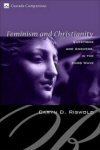
Why should feminists care about Christianity? Conversely, why should Christians care about feminism? In Feminism and Christianity, Riswold presents a collection of concise answers to generate discussion about how the two compare in a twenty-first century setting. This study is written in light of the third wave of feminist activism and scholarship and contemporary Christian theology.
Riswold addresses issues such as race, class, gender, and sexuality with a nuanced approach. This book is an opportunity for Christians to gain a fuller understanding of feminism, moving beyond stereotypes and assumptions in contemporary society. Feminists too can better understand the ongoing relevance of a religion whose social power and core commitments contribute to a vision of a just human community.
Riswold’s talent as a teacher comes shining through as she confronts the suspicions Christians and feminists hold of one another, calling for appreciation of the complexity and diversity in both traditions. Rather than simply reviewing past interactions between Christianity and feminism, she boldly takes the conversation into the twenty-first century by engaging the pressing issues of race, ecology, sexuality, and interreligious understanding. A must-read for students, book groups, and scholars alike.
—Deanna A. Thompson, professor of religion, Hamline University
Even though the conversation between feminism and Christianity has developed for decades, no other book so clearly names and answers the leading questions they ask of each other. . . Riswold’s book is a delightful introductory resource for individuals, classes, and groups as it touches on and aptly answers all the main questions and fears I have heard expressed from students in women’s studies and religion courses concerning feminism and Christianity. All in all, Feminism and Christianity exemplifies Riswold’s gift for thorough, broad scholarship presented in a very clear, engaging, and accessible style.
—Marit A.Trelstad, editor, Cross Examinations: Readings on the Meaning of the Cross Today
Caryn Riswold’s book is a masterpiece in the rare art of distilling complex intellectual histories into lucid accessible narratives, and articulating complex ideas with clarity. This work reveals Riswold’s sophisticated intellect and her agility in feminist thought, Christian theology, and the interplay between them. The reader will enter a strikingly honest, daring, fruitful, and spirited conversation between feminism and Christianity. Riswold highlights the rich diversity within each and illumines their shared commitment to a more just, compassionate, and sustainable world.
—Cynthia Moe-Lobeda, associate professor of theological ethics, Seattle University
Caryn D. Riswold is an associate professor of religion and gender and women’s studies at Illinois College in Jacksonville, Illinois. She is the author of Coram Deo: Human Life in the Vision of God and Two Reformers: Martin Luther and Mary Daly.
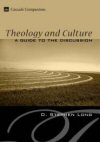
How do we speak about God, who transcends our current context, without applying cultural and linguistic biases from our own culture? To answer, readers need to pay close attention to our defintion of culture. Culture is an exceedingly complex term, especially in the language of faith. This work examines various uses of the term culture in theology today, helping all Christians engage their context more effectively.
Modernity, Steve Long tells us with his patented acerbity, is a broken record that never stops repeating its supposed novelty. If broken records require sharp, swift smacks to be knocked out of their tiresome grooves, Long’s palm-sized book delivers a salutary slap that gets us back on track—and out of confused modern conceptualities that pit theology against culture. An excellent, masterly introduction to its topic.
—Rodney Clapp, editorial director, Brazos Press
Too many ‘guides’ pretend to a kind of theological neutrality that leads us nowhere. Steve Long’s wonderful little book is a noted exception: here is a guide to the theological terrain that doesn’t apologize for working with a compass. Providing a helpful survey of various schools of thought, the book also constitutes an argument for a particular theological understanding of culture. Long not only charts the territory, he also shows students how to plot a path through it. I’ve already been commending it to my students.
—James K.A. Smith, associate professor of philosophy, Calvin College
Long’s book is filled with deep insight and strategic provocation, both of which ought to push the theology and culture conversation beyond its unexamined truisms and self-satisfied dogmas. This is a book for people who take their theology without cream or sugar.
—Brent Laytham, associate professor of theology and ethics, North Park Theological Seminary
This work, as the title suggests, offers a bird’s eye view of the state of play between theology and culture. It provides a valuable summary of the contribution of Richard Niebuhr to the subject, but also suggests there is a need to revise Niebuhr’s classifications in the wake of the rising influence of the theology of Henri de Lubac common to both the Radical Orthodoxy and Communio Catholic scholars. From de Lubac’s perspective, Christ transforms cultures, rather than standing aloof outside them. The dynamics of this transformation is now a pressing theological concern which flows over confessional boundaries.
—Tracey Rowland, dean and permanent fellow, John Paul II Institute for Marriage and Family (Melbourne)
D. Stephen Long, an ordained United Methodist elder in the Indiana Conference, is a professor of systematic theology at Marquette University. His most recent publications include Calculated Futures, and John Wesley’s Moral Theology: The Quest for God and Goodness, and Speaking of God: Theology, Language and Truth.
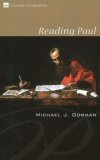
In this new introduction to the Apostle Paul and his gospel, written especially for lay readers, for beginning students, and for those unsure about what to make of Paul, Michael J. Gorman takes the apostle seriously, as someone who speaks for God and to us. After an overview not only of Paul’s radical transformation from persecutor to proclaimer but also of his letter-writing in the context of Paul’s new mission, Reading Paul explores the central themes of the apostle’s gospel: Gorman places special emphasis on the theopolitical character of Paul’s gospel and on the themes of cross and resurrection, multiculturalism in the church, and peacemaking and nonviolence as the way of Christ according to Paul.
Gorman also offers a distinctive interpretation of justification by faith as participation in Christ—an interpretation that challenges standard approaches to these Pauline themes. Reading Paul demonstrates that the apostle of faith, hope, and love speaks not only to our deepest spiritual needs but also to the challenging times in which we live.
Reading Paul provides practical application and keen insight into the life of Paul for students, professors, and general readers. Logos Bible Software dramatically enhances the value of any resource by enabling you to find what you are looking for with lightning speed and incredible precision. That means that by clicking on any word or any Scripture, all references to Paul’s works are included.
This splendid introduction to the Apostle Paul is the best book of its kind: concise, wise, insightful, thoroughly conversant with the best recent scholarship yet thoroughly clear and readable. Against the numerous distorted preconceptions that occlude our reading of Paul, Gorman brilliantly sketches a picture of Paul’s gospel as a gracious, world-transforming message of peace and reconciliation. I will assign this as required reading for students in my introductory New Testament course and put it in the hands of as many pastors and laypeople as possible.
—Richard B. Hays, George Washington Ivey Professor of New Testament, The Divinity School, Duke University
I once had the chance to meet a famous person of whom I was in awe. We met through a mutual friend who was able to coach me on how to better understand this person and not be so nervous around him. That’s what Michael Gorman can do for people who want to get introduced to the apostle Paul. As someone who has gotten to know Paul by deeply immersing himself in Paul’s writings for many years, Michael can be the mutual friend who orients you and helps you relax in the presence of a truly awe-inspiring person. For committed lay people to seminary students and pastors, this well-written and intelligent book will become a standard resource for reading Paul.
—Brian McLaren, author, A Generous Orthodoxy
Michael Gorman has given us an extraordinary gift. He has written an eminently readable introduction to Paul’s message that neither diminishes the apostle’s practical wisdom nor domesticates it. He communicates the profound depth of Paul’s thought in ways that are as inviting as they are challenging. Reading Paul is that rare book that deserves the widest possible readership.
—Joel B. Green, professor of New Testament interpretation, Fuller Theological Seminary
An exceptionally excellent resource for understanding some of Paul’s most profound and potent convictions. Fueled by important questions at both the heart of Paul and of our current culture, this book is a fine vehicle for enabling intelligently sensitive teaching and preaching.
—L. Ann Jervis, professor, University of Toronto
Michael Gorman, already established as a perceptive and creative interpreter of Paul’s letters, now offers us a user-friendly introduction to Paul the person. . . . He makes Paul our contemporary ‘companion’ by introducing major themes from Paul’s letters in such a personal way. I warmly recommend this book to pastors, seminarians, and anyone interested in getting to know Paul better!
—Fr. Ronald D. Witherup SS, provincial superior of the U.S. Province of Sulpicians
Reading Paul well means reading Paul specifically as Christian Scripture, ‘the voice of God speaking to us,’ to use Michael Gorman’s phrase. In this book, Gorman not only reads Paul well, he exemplifies a passion for helping others in the church to do so. He elegantly weaves historical, social, and political aspects of Paul’s context into a powerful theological reading of the apostle’s letters that reverberates with contemporary implications for the church in North America. His lucid exposition of justification as grace-enabled co-crucifixion and co-resurrection with Christ demonstrates keen exegetical and theological acumen and is worth the price of the book. Its clarity and engaging style make it easy to recommend for local church groups and classes where Paul is the focus.
—Andy Johnson, professor of New Testament, Nazarene Theological Seminary
An already established expert on Paul, Gorman now offers the eager but uninitiated reader an accessible and illuminating overview of the apostle’s writings, theology, and spirituality. Here is a ‘big picture’ perspective which invites and enables the reader to envisage, enter into, and enjoy Scripture speaking to us and for God.
—S.A. Cummins, director, MA in biblical studies, Trinity Western University
Michael J. Gorman is Dean of the Ecumenical Institute of Theology at St. Mary’s Seminary and University in Baltimore. He is also Professor of Sacred Scripture at St. Mary’s, holding a joint appointment in the school’s Ecumenical Institute and its Roman Catholic seminary. Dr. Gorman earned his BA summa cum laude in French from Gordon College. He received the MDiv and the PhD cum laude in New Testament from Princeton Theological Seminary, where he was also a teaching fellow in New Testament and an instructor in New Testament Greek. Dr. Gorman’s specialties are the letters, theology, and spirituality of Paul; the gospel of John; Revelation; and early Christian ethics. In addition, he has a strong interest in the relationship between church and culture.